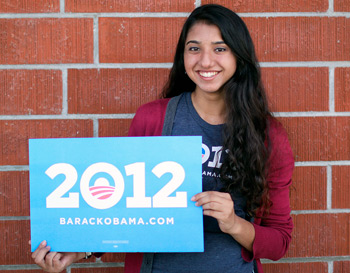Why the election matters to me
I was in eighth grade during the 2008 presidential campaign. It was the first election I followed because I was required to watch the news as homework for my social studies class. At first I couldn’t understand most of what they were saying, but it became easier to understand after a few days. The more I understood, the more I felt that the election was important. I decided to support Barack Obama over John McCain because my parents were supporting Obama, he gave powerful speeches and he seemed to care about the things I cared about—health care for all and gay rights. I begged my mom to buy me an Obama shirt and started debating kids in social studies about abortion and immigration.
Though I was excited to wear my Obama shirt and talk to classmates about something more important than crushes or the school play, I couldn’t vote and the issues I cared about didn’t directly affect me. It wasn’t until my dad lost his job a month before the election that I felt touched by one of its central issues—the economy. Since I knew my family’s financial situation was going to get worse, Obama’s promise to cut taxes for the middle class and provide health care for all meant even more to me. As each day passed with my dad at home and my older sister telling me to ask my parents for things less often, I wanted Obama elected more.
After the election when I was a freshman, I looked into other issues, like education and national defense. I took liberal versus conservative tests and fell in the liberal range. I realized I was a liberal Democrat and signed up for emails to get information on Obama’s 2012 campaign.
I wanted to help re-elect Obama
The summer before junior year, I wanted to start a “Students for Obama” group in Walnut—a conservative town—with my two best friends. We registered our group on barackobama.com and then heard from Allie, our region’s field director. We met her and she told us how we could organize volunteers. Some ideas she gave us were to recruit volunteers outside of grocery stores, meet and discuss campaign issues, and register voters. I pictured the group having a huge Facebook fan base.
We made a list of around 30 classmates who we thought might be interested in joining. Using Facebook, we invited them to an intro meeting at the park, but there were only four confirmed attendees (three of them being the hosts). One person commented on the event page, saying, “How can we help? We’re too young to vote. I really don’t think sticking Obama signs on people’s lawns is going to do anything.” I deleted the event page a few days later, since it seemed like people weren’t interested.
And I can see why. Most politicians are more than two or three times our age and talk about issues, like taxes and health care, that seem to only affect us through our parents. We say we’ll start caring when we’re 18 and actually have jobs and a vote.
But our futures really do depend on the next president’s policies on issues like jobs, the cost of higher education and immigration.
The economy is a big one. According to the U.S. Bureau of Labor Statistics, 12.5 million people are unemployed. I often feel discouraged when my parents tell me that I should be interested in studying computer science or health care because that is where job opportunities are, rather than studying something I care about. Seeing my dad go from job to job also makes me scared for my own prospects. I want to see the next president lower the unemployment rate in the next four years.
Rising college costs also have me worried. My friends and I spend a lot of time scouring the Internet for scholarships because we’re afraid that even if we get into our dream schools, we won’t be able to afford them. I’m doubtful that I’ll be able to afford college without financial aid and student loans. I believe that education is a right that the federal government should guarantee everyone by providing financial aid. I’d like the next president to support education by budgeting more money for Pell Grants and student loans.
Immigration policy also concerns me because I don’t like the idea of a “melting pot” turning away immigrants. Congress could vote on the DREAM Act, a proposal for a path to citizenship for undocumented immigrants. If it passes, the president will decide whether it becomes law. Also, Obama’s executive order that allows undocumented young people to apply for work permits without being deported could be undone or kept depending on who is elected president.
Since getting involved with the election, I’ve made videos with my friends about why young people should vote. We interview people about the 26th Amendment (which gave youth ages 18-20 the vote) and the increasing involvement of young people in elections. We show the videos to people who can vote but feel that their vote doesn’t matter, and to people who can’t vote to get them interested in learning about the issues. One of our videos even aired on C-SPAN.
I’m too young to vote, but I believe people my age can start thinking about what we find important so we feel ready to make informed decisions when we turn 18. However confusing politics may seem, it’s about what issues matter to us, and how we want to see them addressed.
l
For more of L.A. Youth’s 2012 Presidential Election coverage
Comparing Barack Obama and Mitt Romney. Where the presidential candidates stand on the issues.
What do they stand for? Melissa wasn’t sure if she was a Republican or Democrat.






